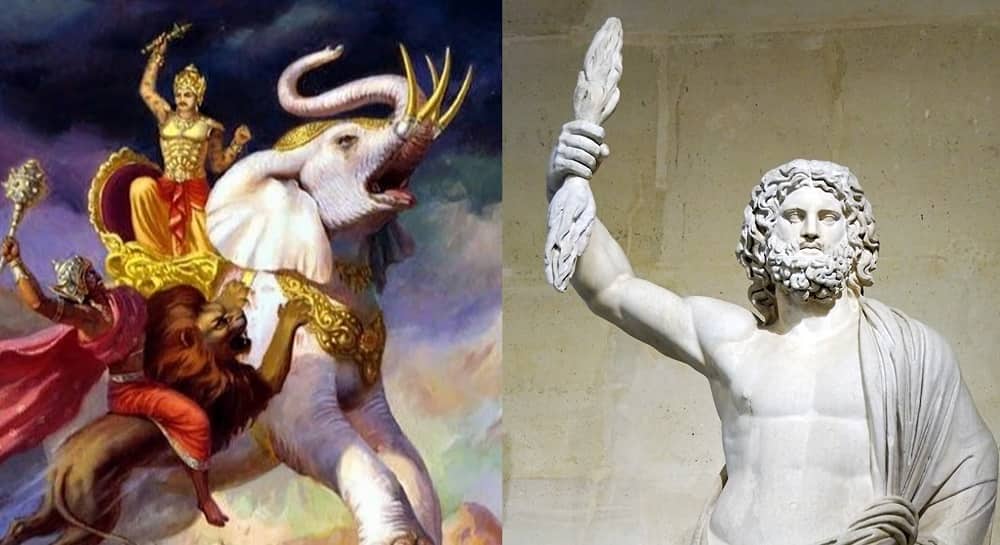When delving into the realms of Greek and Hindu mythology, an intricate tapestry of divine beings emerges, replete with striking parallels and interwoven narratives. These two pantheons, seemingly worlds apart, boast an astonishing convergence of attributes and roles. It's in this fascinating exploration that we uncover the profound connections between gods hailing from distant cultures, transcending the boundaries of time and geography.
Consider the formidable figures of Zeus in Greek mythology and Indra in Hindu cosmology, both holding the illustrious title of king among the gods. They wield thunder and lightning as their celestial tools, creating awe-inspiring displays of power in their respective realms. Yet, their stories and attributes bring forth intriguing distinctions.
The tapestry of commonalities extends to the realms of love and beauty, where both pantheons recognize the presence of a deity revered for their domain over love and beauty. Love and beauty, two pillars of the human experience, find their divine reflections in the mythologies of both the Greek and Hindu traditions.
Exploring the origins of the cosmos, we encounter another layer of intricacy. Greek mythology tells of Gaia, the primordial goddess emerging from the chaotic void of the Universe, giving birth to the world. In contrast, Hindu cosmogony paints a vivid picture of Brahma, the divine creator, emerging gracefully from a lotus that blossoms from the navel of Vishnu, ushering the world into existence.
Understanding Hindu and Greek Mythology
Hindu gods and Greek gods are not the same; they belong to distinct religious and mythological traditions. Hinduism is one of the world's oldest religions, featuring a complex pantheon of gods and goddesses, including Brahma (the creator), Vishnu (the preserver), Shiva (the destroyer), Lakshmi (goddess of wealth), Saraswati (goddess of knowledge), and many others. Hindu gods are often depicted with multiple arms, each holding symbolic objects, and may have various animal or human forms. These deities play various roles in the Hindu cosmology and are worshipped by millions of Hindus worldwide.
On the other hand, Greek mythology is part of the ancient Greek culture and includes gods like Zeus (king of the gods), Hera (queen of the gods), Poseidon (god of the sea), Aphrodite (goddess of love), Athena (goddess of wisdom), and others. Greek gods are often portrayed in human-like forms with distinct personalities and characteristics. They are associated with specific aspects of life and nature and were central figures in Greek mythology.
While both Hindu and Greek religions involve pantheons of divine beings, they have distinct mythologies, cultural contexts, and belief systems. There are no direct equivalences between specific Hindu gods and Greek gods. They represent unique belief systems and worldviews. It's important to recognize and respect the differences between these two rich traditions.
Discovering Shared Traits: Hindu and Greek Deities
As we said earlier, on one side stands Indra Dev, hailed as the sovereign of the Sanatani gods per the Rigveda, while on the opposite flank stands Zeus, revered as the progenitor of the Greek deities. Indra Dev's abode rests upon Mount Meru and presides over Svargaloka, while Zeus' dwelling is atop Mount Olympus. Both these celestial beings boast impressive feats, having vanquished formidable dragons—Indra Dev besting the infamous "dragon Vritra" and Zeus triumphing over Typhon. In the epochal aftermath of the ocean's churning, the god Indra attained immortality by partaking in the nectar, while the Greek gods achieved their eternal status through the consumption of "Ambrosia."
Notably, the Greek pantheon featured a deity akin to Yama, known as Hades. In their shared realm, these entities exhibit common traits - they hold sway over the destinies of the departed souls, and both harbor a profound commitment to upholding justice. The hounds of hell, such as Sharvara in Hindu mythology and Cerberus in Greek mythology, serve as guardians of the gates to their respective underworlds or netherworlds. Sharvara is mentioned as Yama's dog, and Cerberus is known to accompany Hades.
The intriguing question that arises is the uncanny similarity between these mythologies. According to the Rigveda, a colossal conflict known as "The battle of ten kings" or "Dasarajna" unfolded, pitting King Sudasa against ten formidable monarchs. Remarkably, King Sudasa emerged victorious, singlehandedly defeating all adversaries. Following their defeat, some of the ten kings and their followers settled in the Indian subcontinent, while others dispersed to far-flung corners of the world. Among these diasporas, the Alina's clan is said to have found its home in the land of Greece.














0 comments:
Post a Comment